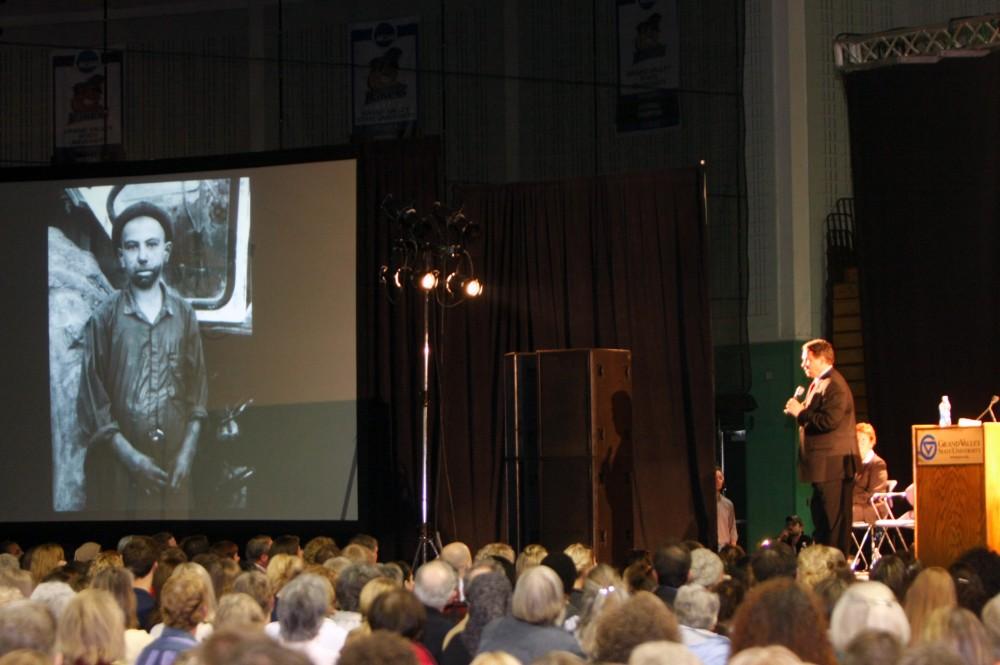‘Three Cups of Tea’ author faces fraud allegations

GVL Archive / Eric Coulter Greg Mortenson speaking at Grand Valley last year. Controversy has arisen regarding Mortenson’s writings.
Apr 21, 2011
Life is far from a cup of tea for author Greg Mortenson, whose book “Three Cups of Tea” has been called into question as sources close to Mortensen dispute its authenticity.
Mortensen’s book was the Community Read at Grand Valley State University last year, and Mortenson visited the university last spring to speak.
Susan Mendoza, director of Undergraduate Research and Integrative Learning at Grand Valley State University, helped organize last year’s Community Reading Project at Grand Valley State University, at which Mortenson gave a presentation. She said her personal reaction to the allegations was both intellectual and emotional.
“I am also saddened by the reports. Greg has served as an inspiration for many children and adults, both locally and internationally,” Mendoza said. “The issues that Greg’s work raises are very real, and I hope that the public does not cast them aside as his story and work is discredited. To do so can turn the hopeful into cynics.”
Greg Mortenson claims to have built more than 140 children’s schools in Pakistan and Afghanistan. His charity, the Central Asia Institute, has spent and received millions, including $100,000 from President Obama’s Nobel Peace Prize award and $75,000 from fellow author Jon Krakauer.
Not long before 60 Minutes aired its exposure on Mortensen, Krakauer, calling the CAI “Mortensen’s personal ATM machine,” had already withdrawn support and was openly opposing the authenticity of Mortenson’s book and calling attention to Mortenson’s financial dealings.
CBS news series 60 Minutes reported that Mortenson’s speaking engagements regularly net $30,000.
CBS visited 30 schools built by Mortenson in Pakistan and in its report found roughly half of them unoccupied or used for some other purpose. CBS spoke to several people from the village of Korphe, a small village in northeast Pakistan where Mortenson claimed to have stumbled after separation from his climbing party during an attempt to climb K2, the world’s tallest mountain. His claims that he was held captive by the Taliban have also been called into question.
“I don’t know when CBS was there, but if it was when school was out, the schools would appear to be empty,” Jeff McMillan, Mortensen’s personal assistant, told the New York Times.
He said the Afghan school year began on March 23.
“As in any event reported by the popular media, it is important to note that the truth is in the middle and is rarely unveiled,” she said. “Until there is an ability for all voices to be heard, including Greg’s voice and the staff of CAI (Central Asia Institute), I am still listening and trying to understand the complexities and contradiction of the points and counter points.”
The Community Reading Project receives book recommendations from both the GVSU community and community partners.
Mendoza said “Three Cups of Tea” was recommended by a class at GVSU that studied global issues. The book was reviewed by the CRP committee and community partners based on the program’s selection criteria. At the point the book was selected, more than 100 community organizations, public libraries, universities and colleges had used “Three Cups of Tea,” she said.
While Mortenson was visiting GVSU, Mendoza said his lectures in both Holland and Allendale were well received by the community.
“He took care in responding to high school student questions at the Holland lecture,” she said. “After the Allendale lecture, he signed books until 1:30 a.m. He also purchased stacks of books to give to students and community members who were waiting to meet him. He took the time to speak with nearly everyone, to hear their stories and hear how his story inspired them.”
In addition to review by the CPR Committee, Medoza said committee members contact universities and libraries that have used the books in the past for planning purposes, but also to have a better understanding of the quality of the lecture and the subsequent campus dialogue.
The larger issue in the investigation of “Three Cups of Tea” is the extent to which it has been incorporated to U.S. Military operations. For Afghanistan-bound soldiers, it is required reading.
The New York Times reported that top Pentagon officials did not respond to the accusations, but maintained that they still support his work.
“We continue to believe in the logic of what Greg is trying to accomplish in Afghanistan and Pakistan because we know the powerful effects that education can have on eroding the root causes of extremism,” said a military official, who asked not to be named under ground rules imposed by the Pentagon.























